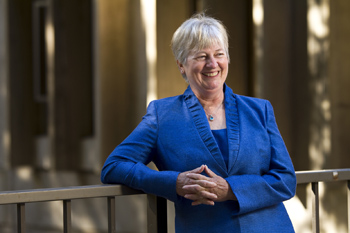Campus News
Alison Galloway wins forensic anthropology career achievement award
Alison Galloway, professor of anthropology and campus provost/executive vice chancellor at UC Santa Cruz, is winner of the highest honor offered by the Physical Anthropology Section of the American Academy of Forensic Sciences.

Alison Galloway, UCSC professor of anthropology and EVC-designate
Galloway received the T. Dale Stewart Award for career achievement, Wednesday, February 20, during the AAFS’s 65th anniversary meeting in Washington, D.C.
The award is named for Thomas Dale Stewart, founder of modern forensic anthropology and a major contributor to most areas of human skeletal biology, paleopathology, and related areas of physical anthropology.
Galloway regularly consults with law enforcement officials in California and beyond who rely on her forensic skills when they need help identifying human remains. Many of the bodies she examines are homicide victims, and Galloway often appears in court as an expert witness to present her findings.
“Our role is to provide testimony based on what we found from the body,” Galloway explained in an interview after being named campus provost and executive vice chancellor in 2010. “We are the victim’s only chance to provide information, which can result in a successful prosecution, or get somebody off who isn’t guilty.”
Galloway joined the UCSC faculty in 1990. She earned her bachelor’s degree at UC Berkeley and her master’s and Ph.D. at the University of Arizona.
The American Academy of Forensic Sciences is a multi-disciplinary professional organization that provides leadership to advance science and its application to the legal system. At its annual meeting held each February, more than 800 scientific papers, seminars, workshops, and other special events are presented. The AAFS consists of eleven sections representing a range of forensic specialties.
Stewart died in 1997 at the age of 96 after a long career that included consulting with the FBI and U.S. military on forensic identification. Between 1943 and 1969, Stewart reported on at least 254 forensic cases for the FBI and others, according to a biography written by one of his graduate students at the University of Kansas and published by the National Academy of Sciences.
He was elected an honorary member of the AAFS in 1974 and regularly attended the group’s annual meetings. In 1981 he became the second recipient of the Physical Anthropology section’s career achievement award. The award was renamed the T. Dale Stewart Award in 1987.